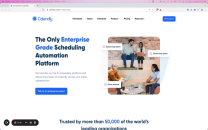
Calendly
Founded Year
2013Stage
Incubator/Accelerator | AliveTotal Raised
$350.55MRevenue
$0000Mosaic Score The Mosaic Score is an algorithm that measures the overall financial health and market potential of private companies.
+3 points in the past 30 days
About Calendly
Calendly focuses on helping in the meeting lifecycle for individuals, teams, and organizations. The company offers a solution that automates the process of scheduling meetings, eliminating the need for back-and-forth emails to find suitable times, and integrates with calendars to reflect real-time availability. It primarily serves sectors such as sales, marketing, customer success, recruiting, and education. The company was founded in 2013 and is based in Atlanta, Georgia.
Loading...
Calendly's Product Videos


ESPs containing Calendly
The ESP matrix leverages data and analyst insight to identify and rank leading companies in a given technology landscape.
The calendar management technology market provides tools and technologies to manage schedules, appointments, and meetings. Calendar management technologies include digital calendars, scheduling software, and meeting management systems. The market has seen significant growth in recent years, driven by the increasing adoption of remote work and the need for efficient and flexible scheduling solution…
Calendly named as Leader among 8 other companies, including Booxi, Phorest, and Cal.com.
Calendly's Products & Differentiators
Calendly
Calendly is the easiest way for teams to schedule, prepare, and follow-up on external meetings.
Loading...
Expert Collections containing Calendly
Expert Collections are analyst-curated lists that highlight the companies you need to know in the most important technology spaces.
Calendly is included in 2 Expert Collections, including Unicorns- Billion Dollar Startups.
Unicorns- Billion Dollar Startups
1,270 items
Work From Home Startups
91 items
Track startups and capture company information and workflow.
Latest Calendly News
Mar 21, 2025
How to navigate the shift from Product-Led Growth to Enterprise Hello and welcome to The GTM Newsletter by GTMnow – read by 50,000+ to scale their companies and careers. GTMnow shares insight around the go-to-market strategies responsible for explosive company growth. GTMnow highlights the strategies, along with the stories from the top 1% of GTM executives, VCs, and founders behind these strategies and companies. Every great Product-Led Growth (PLG) company eventually faces a crossroads: When and how to introduce a Sales-Led Growth (SLG) motion. Many make this shift reactively rather than strategically. PLG and SLG aren’t competitors, they’re partners in growth. Companies that seamlessly bridge the two unlock incredible scale. Success requires a data-driven approach, a customer-first mindset, and a willingness to embrace change. In this piece, GTM leaders share key lessons on how to navigate this transition effectively while keeping a customer-first approach. Growth isn’t a choice, your customers decide it “You don’t decide to make the shift from PLG to SLG, your customers do.” — Jessica Gilmartin Companies often reach a tipping point where users demand enterprise features, security, and team-wide adoption. Rather than resisting the transition, companies should follow customer behavior signals and build a sales motion that complements, rather than competes, with PLG. 3 key indicators that it’s time to introduce SLG: Customers requesting enterprise features (SSO, security, admin controls). Teams organically growing within accounts. Inbound requests for larger contracts and enterprise agreements. PLG to PLS: Understanding the evolution Growth strategies evolve as companies scale. Holly Chen breaks it down: In the early days, PLG can feel like magic – users sign up and adoption grows without direct sales interaction. But as companies move upmarket, they often transition from PLG to PLS. Why make this shift? Andrew Johnston explains: Complex customer needs: Larger customers demand more personalized support, security, and integrations. Enterprise sales cycles: Moving upmarket means more stakeholders, approvals, and custom solutions. Revenue potential: Without a sales motion, high-value accounts may remain untapped. The PLG-SLG hybrid is harder than it looks While hybrid PLG-SLG models offer massive upside, they also introduce complexity. Common pitfalls: Resource allocation conflicts: Enterprise and PLG teams require different marketing, sales, and product support – creating an internal tug-of-war. Website & CTA prioritization: Should the homepage push free trials, demos, or enterprise sales? Striking a balance is tough. Product & engineering trade-offs: PLG requires simplicity, while enterprise customers demand customization. Prioritization is key. Companies that succeed in hybrid motions are those that treat PLG and SLG as complementary rather than separate business units. How to nail the PLG-SLG transition 1. Map the customer Journey from PLG to Enterprise Identify patterns in how free users evolve into enterprise buyers. Look for specific in-product behaviors that indicate expansion potential (e.g., integrations, increased seat count). 2. Define your Product-Qualified Lead (PQL) criteria Reverse-engineer signals from past enterprise deals to define high-potential PQLs. Use personalized, value-driven outreach when engaging them. Avoid generic “Want to talk to sales?” emails—offer specific solutions based on their usage. 3. Unify PLG and SLG teams under a shared customer strategy Marketing and sales shouldn’t work in silos; they should co-own growth. Prioritize customer experience over internal attribution battles. Build a single source of truth for customer data across marketing, sales, and product teams. 4. Create an operating and governance model for data and decision-making Establish an Operating Committee of directors/VPs across departments to collaborate on major shifts. Have a Governing Committee (C-suite) to provide executive alignment and unblock major roadblocks. Ensure that data and analytics are centralized, accurate, and actionable. Examples: Asana & Calendly’s PLG-SLG evolution Jessica Gilmartin , former CMO and CRO at Calendly and Head of Revenue Marketing at Asana, shares insight to Asana and Calendly’s evolutions. Calendly: Using product signals to drive enterprise sales Calendly leveraged integration data to identify high-value users. If an executive-level user connected their calendar to Salesforce, it signaled serious intent. Instead of pushing an immediate sales call, they received a targeted outreach offering value (e.g., helping them optimize that integration). Asana: The balancing act of enterprise and PLG At Asana, the team initially kept enterprise marketing and PLG marketing completely separate. Over time, they realized this fragmented approach didn’t align with how customers actually purchased. The solution? A holistic view of the customer journey, ensuring that enterprise buyers had a self-serve experience before engaging with sales. 👂 More for your eardrums Jaleh Rezaei is the CEO & Co-founder of Mutiny, a company reimagining the B2B buying experience by transforming transactional relationships into meaningful connections through AI-powered personalization. Mutiny helps enterprises restore the human element in modern buying at scale, and is used by some of the fastest growing companies in the world including Amplitude, Snowflake and Qualtrics. The company is backed by Sequoia Capital, Tiger Global, and CMOs of companies such as Uber, Condé Nast and Salesforce. Prior to Mutiny, Jaleh was the Head of Marketing and Business Development at Gusto, where she grew the company from 500 to 50,000 customers over 4 years. She was the Director of Product Marketing at VMware prior to Gusto. See more top GTM jobs on the GTMfund Job Board . If you’re looking to scale your sales and marketing teams with top talent, we couldn’t recommend our partner Pursuit more. We work closely together to be able to provide the top go-to-market talent for companies on a non-retainer basis. See more top GTM jobs on the GTMfund Job Board . If you’re looking to scale your sales and marketing teams with top talent, we couldn’t recommend our partner Pursuit more. We work closely together to be able to provide the top go-to-market talent for companies on a non-retainer basis. 🗓️ GTM industry events Upcoming go-to-market events you won’t want to miss: The GTM Workshop for AI Founders – a GTMfund event: March 25, 2025 (San Francisco, CA) – private registration (email for details) GTMfund Dinner: March 25, 2025 (San Francisco, CA) – private registration More GTMfund events TBA
Calendly Frequently Asked Questions (FAQ)
When was Calendly founded?
Calendly was founded in 2013.
Where is Calendly's headquarters?
Calendly's headquarters is located at 271 17th Street North West, Atlanta.
What is Calendly's latest funding round?
Calendly's latest funding round is Incubator/Accelerator.
How much did Calendly raise?
Calendly raised a total of $350.55M.
Who are the investors of Calendly?
Investors of Calendly include Atlanta Tech Village, OpenView Venture Partners, ICONIQ Capital, Atlanta Ventures and David Cummings.
Who are Calendly's competitors?
Competitors of Calendly include Agendize, Vimcal, Timify, Cal.com, Clockwise and 7 more.
What products does Calendly offer?
Calendly's products include Calendly.
Who are Calendly's customers?
Customers of Calendly include La-Z-Boy, Bitly, Lyft, Vonage and CI Assante Wealth Management.
Loading...
Compare Calendly to Competitors

Chili Piper is a demand conversion platform that focuses on optimizing the sales process. The company provides services that include qualifying leads, routing them to sales representatives, and scheduling meetings through channels, all aimed at converting leads into sales meetings. Chili Piper's platform is used by sales and marketing teams for lead management. It was founded in 2016 and is based in New York, New York.
CommandDot operates as a technology company that focuses on the meeting scheduling process within the productivity software domain. It offered a Chrome Extension that integrated Google Calendar with Gmail, including features like time zone conversion, interactive calendar views, and availability sharing. CommandDot primarily served professionals seeking to use various email and calendar platforms. It was founded in 2020 and is based in San Francisco, California.

FreeBusy automates meeting scheduling and serves various sectors including recruiting, sales, customer assistance, consulting, and enterprise scheduling. The company offers a scheduling assistant that integrates with multiple calendars and web conferencing tools. It is based in San Francisco, California.

Engageware is an AI-enabled customer engagement platform that provides enterprise-grade solutions across various industries. The company offers products that automate customer service and sales through omnichannel support, enhance efficiency with knowledge management tools, and convert opportunities into revenue with efficient appointment scheduling. Engageware primarily serves sectors such as financial services, healthcare, education, retail, and technology. Engageware was formerly known as TimeTrade SilverCloud. It was founded in 1999 and is based in Tewksbury, Massachusetts.

Cal.com focuses on providing open-source scheduling infrastructure for various business sectors. The company offers a platform that enables users to synchronize calendars, automate meeting scheduling, and create personalized scheduling links for efficient appointment booking. Cal.com primarily serves sectors such as telemedicine, education, corporate hiring, and professional services. Cal.com was formerly known as Calendso. It was founded in 2021 and is based in San Francisco, California.

CatchApp is a company that provides appointment scheduling solutions in the productivity and scheduling tools industry. Their offering includes an online booking system that allows professionals and businesses to manage appointments, with calendar integration, automated reminders, and the option to embed booking links on websites. The system supports various sectors by offering services such as video call integration and 24/7 booking availability. It was founded in 2016 and is based in London, England.
Loading...
